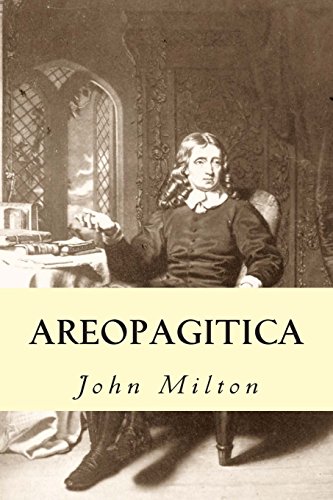Items related to Areopagitica

Areopagitica is a publishing history work by John Milton published as an appeal to the English Parliament to rescind their Licensing Order of 1643, which was designed to bring publishing under government control by creating a number of official censors to whom authors would submit their work for approval prior to publication.Areopagitica was published 23 November 1644 at the height of the English Civil War. It takes its title in part from Areopagitikos, a speech written by Athenian orator Isocrates in the 5th century BC. (The Areopagus is a hill in Athens, the site of real and legendary tribunals, and was the name of a council whose power Isocrates hoped to restore.) Some argue that it is more importantly also a reference to the sermon which St Paul preached against ignorance and idolatry in Athens, recorded in Acts 17:18–34.[2]Like Isocrates, Milton had no intention of delivering his speech orally. Instead, it was distributed via pamphlet, defying the same publication censorship which he argued against. As a Protestant, Milton had supported the Presbyterians in Parliament, but in this work he argued forcefully against Parliament's 1643 Ordinance for the Regulating of Printing, also known as the Licensing Order of 1643, in which Parliament required authors to have a license approved by the government before their work could be published.This issue was personal for Milton, as he had suffered censorship himself in his efforts to publish several tracts defending divorce (a radical stance which met with no favour from the censors). Areopagitica is full of biblical and classical references which Milton uses to strengthen his argument. This is particularly fitting because it was being addressed to the Calvinist Presbyterians who comprised Parliament at that time.According to George H. Sabine, the Areopagitica was based on an engaged public:Its basic principle was the right and also the duty of every intelligent man as a rational being, to know the grounds and take responsibility for his beliefs and actions. Its corollary was a society and a state in which decisions are reached by open discussion, in which the sources of information are not contaminated by authority in the interest of party, and in which political unity is secured not by force but by a consensus that respects variety of opinion.John Milton was born in Bread Street, London on 9 December 1608, the son of composer John Milton and his wife Sarah Jeffrey. The senior John Milton (1562–1647) moved to London around 1583 after being disinherited by his devout Catholic father Richard "the Ranger" Milton for embracing Protestantism.[5] In London, the senior John Milton married Sarah Jeffrey (1572–1637) and found lasting financial success as a scrivener.[6] He lived in and worked from a house on Bread Street, where the Mermaid Tavern was located in Cheapside. The elder Milton was noted for his skill as a musical composer, and this talent left his son with a lifelong appreciation for music and friendships with musicians such as Henry Lawes.[7]Milton's father's prosperity provided his eldest son with a private tutor, Thomas Young, a Scottish Presbyterian with an M.A. from the University of St. Andrews. Research suggests that Young's influence served as the poet's introduction to religious radicalism.[8] After Young's tutorship, Milton attended St Paul's School in London. There he began the study of Latin and Greek, and the classical languages left an imprint on both his poetry and prose in English (he also wrote in Italian and Latin).Milton's first datable compositions are two psalms done at age 15 at Long Bennington. One contemporary source is the Brief Lives of John Aubrey, an uneven compilation including first-hand reports.
"synopsis" may belong to another edition of this title.
About the Author:
John Milton (1608 – 1674) was an English poet, polemicist, man of letters, and a civil servant for the Commonwealth of England under Oliver Cromwell. His poetry and prose reflect deep personal convictions, a passion for freedom and self-determination, and the urgent issues and political turbulence of his day. Writing in English, Latin, Greek, and Italian, he achieved international renown within his lifetime, and his celebrated Areopagitica (1644), written in condemnation of pre-publication censorship, is among history's most influential and impassioned defenses of free speech and freedom of the press.
"About this title" may belong to another edition of this title.
- PublisherCreateSpace Independent Publishing Platform
- Publication date2014
- ISBN 10 1502564726
- ISBN 13 9781502564726
- BindingPaperback
- Edition number1
- Number of pages46
- Rating
Buy New
Learn more about this copy
US$ 6.93
Shipping:
US$ 12.51
From United Kingdom to U.S.A.
Top Search Results from the AbeBooks Marketplace
Areopagitica
Published by
CreateSpace Independent Publishing Platform
(2014)
ISBN 10: 1502564726
ISBN 13: 9781502564726
New
Paperback
Quantity: 1
Seller:
Rating
Book Description Paperback. Condition: Brand New. 46 pages. 9.00x6.00x0.11 inches. This item is printed on demand. Seller Inventory # zk1502564726
Buy New
US$ 6.93
Convert currency

